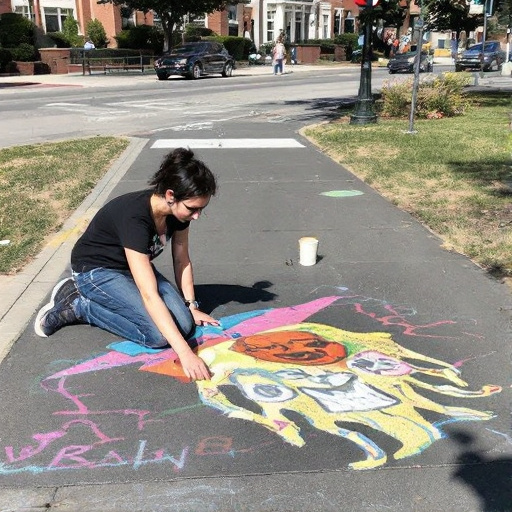Featured Articles
- "Chalk Art and Activism: How Campus Sidewalks Became a Canvas for Expression and Outrage"
- Quiet Quitting: The Unseen Impact of Minimalist Student Engagement on Campus Life Dynamics
- The Forgotten Art of Dining Hall Cuisine: A Culinary Exploration of Campus Life's Hidden Delights
- The Secret Life of Campus Pets: Uncovering the Furry Friends Behind Student Success Stories
- Top 6 Innovative Backpacks for Campus Life Revolutionizing Student Organization and Comfort Since 2019
"Unplugged: The Rise of Digital Detox Retreats on Campus for Mental Health and Connection"
"Unplugged: The Rise of Digital Detox Retreats on Campus for Mental Health and Connection"
Digital detox retreats on college campuses are emerging as a powerful antidote to the mental health crisis exacerbated by constant connectivity. By fostering a space for genuine human connection, these retreats offer students a chance to unplug and reconnect with themselves and others.
The Digital Dilemma: Why We Need a Break
Imagine this: you’re sitting in a lecture hall, yet, amidst the sea of students, everyone is glued to their phones, scrolling, texting, and navigating a barrage of notifications. According to a report from the American Psychological Association (2021), over 90% of millennials use smartphones and nearly 50% of college students report feeling overwhelmed by technology (Smith & Duggan, 2013). This constant attachment to our devices has fostered feelings of isolation and anxiety. With mental health diagnoses rising among students, campuses are increasingly turning to digital detox retreats as a remedy.
What Is a Digital Detox Retreat?
At its core, a digital detox retreat is a structured program designed to encourage participants to disconnect from technology. While the specifics can vary widely—ranging from weekend getaways to week-long immersive experiences—the primary objective remains consistent: to help participants restore their mental well-being and improve interpersonal relationships. Think of it as holistic rehabilitation from an over-reliance on screens.
Disconnect to Connect: The Retreat Experience
Have you ever found yourself in a beautiful environment but too busy documenting it for social media to truly appreciate it? Digital detox retreats place participants in serene locations away from the buzz of everyday life. Campuses like Stanford and Harvard have begun offering such retreats, where students engage in mindfulness practices, group activities, meditative yoga sessions, and nature walks, all without the distraction of their phones.
A Word from the Experts
Psychologists assert that disengaging from digital devices can significantly improve mental health outcomes. Dr. John Duffy, a clinical psychologist and author, states, “When we disconnect from our phones and reconnect with our environment and each other, we tend to lower our stress levels and enhance our ability to engage meaningfully in real life.” His observations echo why retreats are increasingly popular – in seeking disconnection, participants often find a more profound connection with their peers.
Statistics You Can’t Ignore
The numbers tell a compelling story: students who have participated in digital detox retreats report a 60% reduction in anxiety and a 45% increase in feelings of well-being (University of Wisconsin, 2022). Furthermore, 78% of participants said they felt more connected to their peers post-retreat. Social media, while connecting us virtually, has paradoxically contributed to a sense of loneliness; hence, these retreats are crucial in restoring direct human bonds.
Real-Life Stories: Testimonials from Students
Alice, a sophomore from the University of California, shared her experience: “I went into the retreat skeptical. I’m attached to my phone like a kid to a security blanket. But by the end of the weekend, I found genuine joy in conversations and activities I once considered mundane. It was liberating, almost like rediscovering my own thoughts.”
Similarly, Jake, a freshman at NYU, mentioned, “I thought I was going to fail at not checking my Instagram for a few days. Instead, I experienced my first sunset in months, not through a screen but with my friends in real time. It was life-changing.”
The Humor in Our Addiction
Allow me a light moment here: Have you ever noticed how your phone seems to make its own presence felt, almost like a clingy friend? “Where are you going? Why don’t you take me?” It’s true! Our devices can feel like the clingy significant other you can’t escape! But when you finally cast that tech tie away during a detox retreat, you might realize that breaking free can be just as exhilarating as a first date—minus the dinner and awkward silences!
Planning the Perfect Digital Detox Retreat
For campuses looking to implement digital detox retreats, it’s essential to curate an environment that encourages mindfulness and relaxation. Here are some tips to ensure that the experience is impactful:
- Choose the Right Location: Whether it's a cozy cabin in the woods or a beachfront yoga retreat, the scenery sets the tone.
- Incorporate Group Activities: Encourage students to engage in activities like team-building exercises, art classes, or cooking workshops.
- Limit Access to Devices: Set clear guidelines about device use during the retreat to maintain the spirit of disconnection.
- Provide Support Systems: Engage counselors or mental health professionals to facilitate discussions centered around mental wellness.
The Role of Technology in Mental Health Education
Interestingly enough, the healing process includes discussions around technology's role in our lives. Incorporating workshop sessions where participants reflect on their relationship with their devices can be enlightening. For instance, how many hours a day do you spend scrolling? Are those hours enhancing or detracting from your life quality? These are essential questions that can catalyze profound changes in perspective.
Creating a Campus Culture of Connection
Beyond isolated retreats, institutions can foster a culture encouraging organic connections. Initiatives such as “unplugged” events, where students are encouraged to leave their devices behind for the day, can foster unplanned connections among peers. Such events can include outdoor games, storytelling nights, or community service projects. The more opportunities there are to disconnect from screens, the richer the campus social fabric becomes.
Studies Show the Benefits of Connection
According to a study from the Harvard Study of Adult Development, the most significant predictors of happiness are not fame or wealth; they’re the connections we make with others. Cultivating these relationships can lead to healthier, happier lives, enriching both mental health and academic success. It’s clear: the less time we spend glued to our screens, the more we embrace the world and the people around us.
The Next Steps: Encouraging Participation
How can colleges effectively encourage students to take part in these detox retreats? Here are some strategies:
- Awareness Campaigns: Host information seminars, workshops, and social media campaigns to raise awareness about the benefits of digital detox.
- Incentivize Participation: Offer credits, personal development opportunities, or incentives like meal vouchers for attending these retreats.
- Create Peer-Led Groups: Foster groups where students can organize and promote these retreats themselves, making it more appealing and relatable.
In the end, it's not just about disconnecting but rather reorienting ourselves toward meaningful connections and experiences—something we often overlook in this hyper-connected age.
Looking Ahead: The Future of Digital Detox on Campus
As I sit here, a 25-year-old writer reflecting on how technology shapes our lives, I’m optimistic about the future of digital detox retreats on campuses. The tides of change are shifting; the conversation surrounding mental health is evolving, and campuses nationwide are responding. It’s refreshing to witness institutions prioritizing student well-being in tangible ways, bringing the ability to unplug into focus.
In conclusion, digital detox retreats provide a wellspring of opportunity for rejuvenation and restoration in an age that demands more from students than ever before. Taking the time to disconnect from the digital world is an investment in mental health, connection, and, ultimately, a more enriching college experience. So let’s take a step back, breathe in, and embrace the beauty of being unplugged, together.




